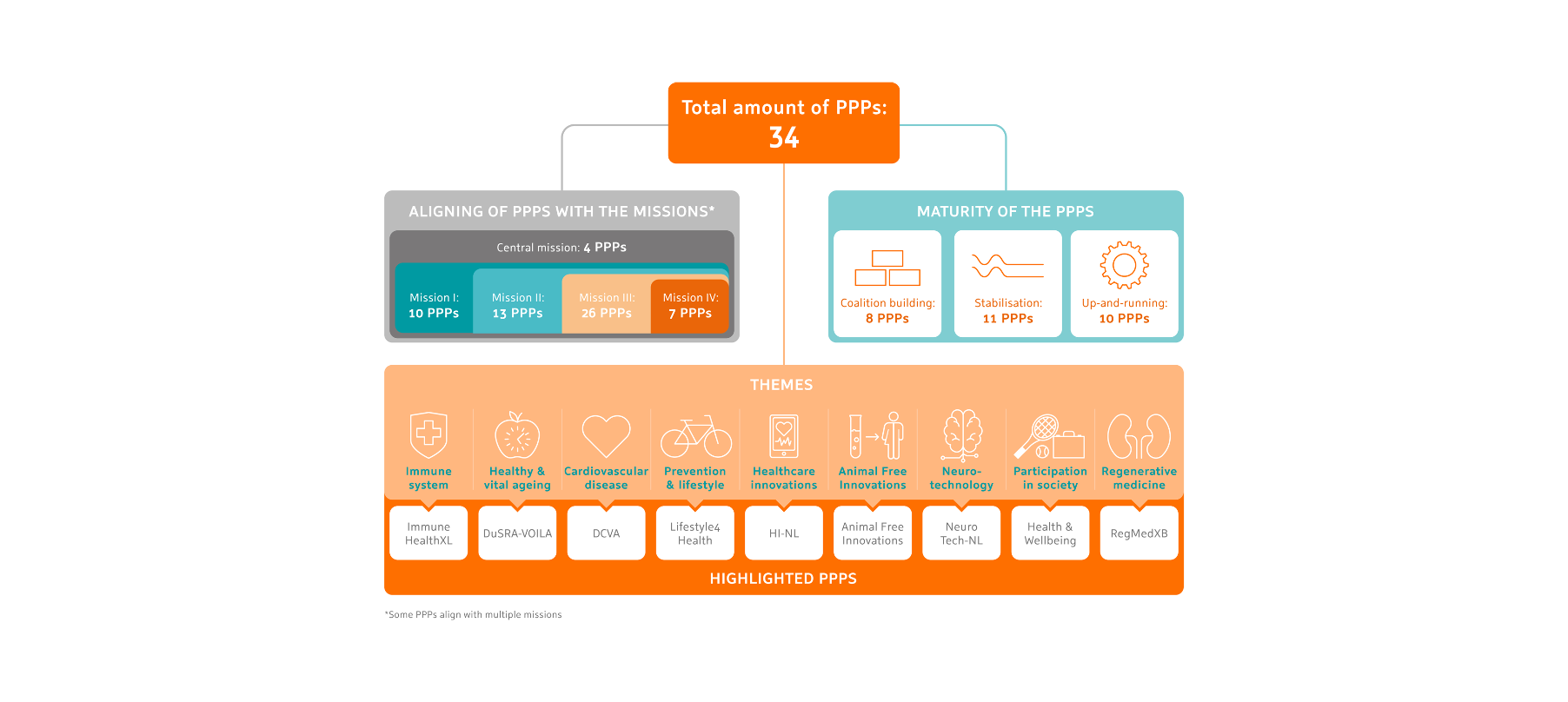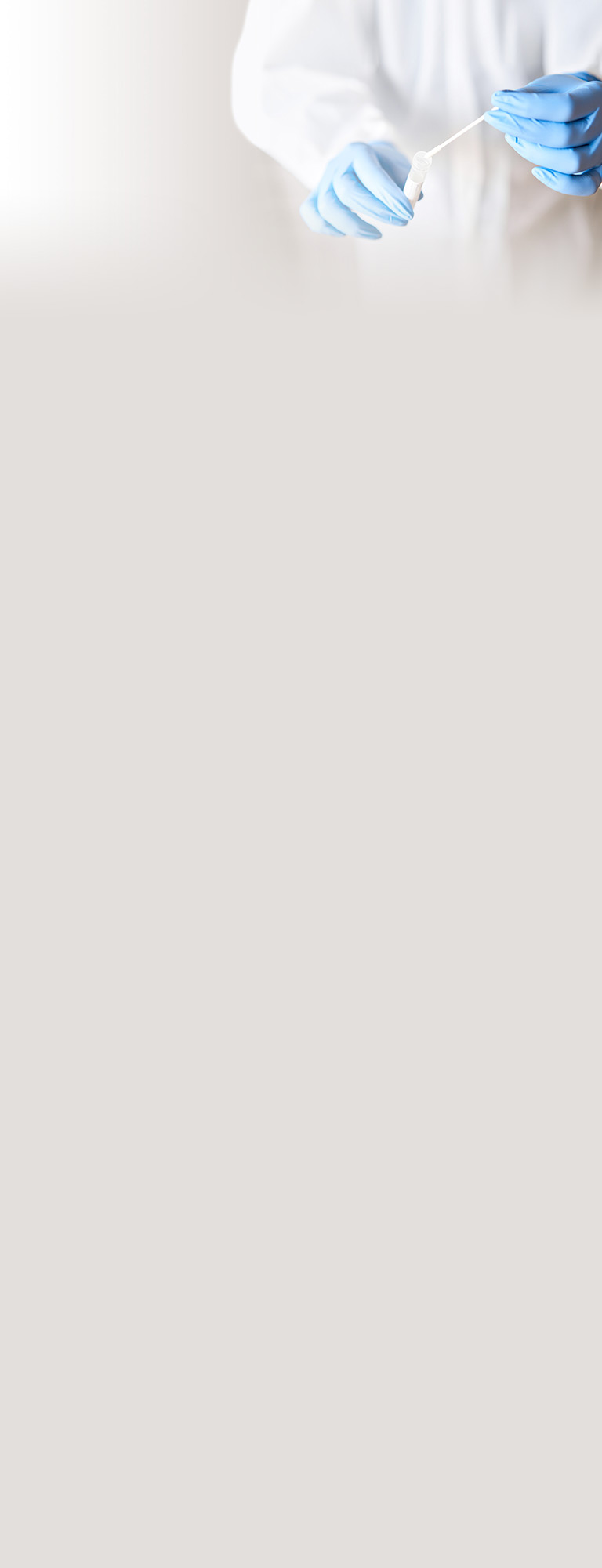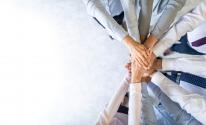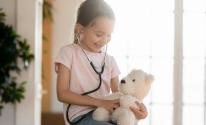
Chapter 2
Partnerships
For vital functioning citizens in a healthy economy
Top Sector LSH stimulates, facilitates and finances a variety of Public-Private Partnerships (PPPs) to realise its overarching motto “vital functioning citizens in a healthy economy”. A PPP is a national multi-year, thematic and programmatic collaboration between quadruple helix organisations that contribute to at least one of the five missions from the societal theme Health & Care. Next to over 500 PPP R&D projects, there are currently about 40 strategic, thematic, long-term collaborations that strive for innovative moonshots within large, national consortia.
Based on their societal relevance, scientific quality and economic potential, Top Sector LSH will support and facilitate these strategic PPPs via specialised information sessions and matchmaking meetings to enable maximal knowledge exchange.
For more information and inspiration, visit our new PPP webpage!
A succesfull year
Despite the COVID-19 pandemic and the resulting obstacles, 2020 still turned out to be a successful year for many PPPs.
Health Innovation Netherlands (HI-NL) kicked off at the start of 2020 and offers a Round Table service to innovators in medical technology. Its purpose is to give innovators early insights into the path they will have to follow to successfully bring their idea to the market. Throughout 2020, six HI-NL Round Tables took place, bringing together healthcare providers, patients, regulators, policy makers, insurers, CE-experts and methodologists.
We also celebrated the kick-off of the PPP Precision Medicine for More Oxygen (P4O2). P4O2 aims to identify treatable traits and innovative personalised therapeutic strategies to prevent the progression of early-stage damage and to reverse established lung damage by stimulating repair. ImmuneHealthXL made the last steps towards its stabilisation and is on its way to realising its mission to improve Dutch citizens’ health by protecting, maintaining, restoring and empowering a healthy immune system from childhood to old age.
Together with many partners and experts, Lifestyle4Health stressed the urgency and momentum for prevention & a healthy lifestyle, via a publication of scientific insights into the relation between COVID-19, metabolic dysregulation, resistance and lifestyle interventions. Via its national collaboration with Partnerschap Overgewicht NL and Vereniging Arts & Leefstijl, Lifestyle4Health set up the website leefstijlencorona.nl. Furthermore, Lifestyle4Health supported the government’s national lifestyle campaign related to the COVID-19 pandemic.

Knights of the round table
Bringing perspectives together and providing collective guidance to the innovator
In 2020 Health~Holland and Health Innovation Netherlands (HI-NL) decided to work together and advise consortia funded through the Match Call programme to make use of the HI-NL Round Table service. This is particularly encouraged if the innovation studied will request CE marking during or within two years of the project. The shared goal of Health~Holland and HI-NL is to set new innovations on the right path from the outset.
In 2020, the first Round Table supported by a Match Call grant was successfully held. It advised on a novel COVID-19 rapid test method that TNO was developing. The innovators praised the useful discussions and hands-on advice about the following steps that emerged from this Round Table. In January 2021, another Round Table making use of the Health~Holland/HI-NL collaboration took place, and many more will follow this year.
For consortia eligible for the Match Call programme and who are working on an innovation that would benefit from the guidance of a HI-NL Round Table, the combination is an excellent proposition. The consortium will gain all the benefits of the HI-NL Round Table while being supported by the PPP Allowance to cover (part of) the related costs.
Supporting the Health & Care missions: +5, -30
With the collaboration, HI-NL is also proud to contribute to the five missions of the societal theme Health & Care. The central mission is that by 2040 all Dutch citizens will live at least five years longer in good health, while the health inequalities between the lowest and highest socioeconomic groups will have decreased by 30%. Medical technology can play a key role in realising this mission. New innovations have the potential to make care more accessible to all citizens and more affordable to the system. But it will still be essential to evaluate upfront, advise on how an innovation can actually add the value we expect, and then provide the necessary guidance to ensure that the innovation is implemented in a meaningful manner for its users. By providing such guidance and helping generate the appropriate evidence of value, HI-NL supports this central mission of Health & Care.
Technology also facilitates the transition of care from the clinical setting to the home setting (mission II) and enables people with chronic conditions or limitations to actively participate in society (mission III). In those cases, health innovations will often be used by citizens and patients themselves, for example to monitor the progression of their condition at home, with or without active guidance from a healthcare professional. For those products, it is also vital that the right innovation is used for the right purpose, and the right evaluation is applied to the right innovation. HI-NL helps to give actionable guidance based on stakeholders’ requirements from an early stage onwards, which increases thechances of successful implementation.

Improving diagnostics for SARS-CoV-2 together
INTERVIEW
With Bart Keijser, Principal Scientist at TNO
The Dutch are known for their open and welcoming attitude to collaboration and knowledge exchange. Collaboration between public and private parties has been pivotal for reducing the societal and economic impact of the COVID-19 crisis. More than ever, people were motivated to join forces and find a solution for this global challenge, says Bart Keijser. In our project “improved diagnostics for SARS-CoV-2 (ID4Corona)” the individual interests of the partners moved to the background. Each partner proved very willing to consider how their strengths could improve the diagnostic process for SARS-CoV-2.
Efficient and large-scale testing
Many factors challenge the diagnostic process for SARS-CoV-2, including shortages in reagents and consumables. Furthermore, the infrastructure for medical diagnostic testing has been established to perform multiple, symptom-based diagnostic tests for a single patient's benefit and not to offer a single test for large groups of individuals. Keijser: ‘With a variety of partners, from knowledge institutions to companies and from manufacturers to suppliers, ID4Corona aims to realise efficient and large-scale testing in society by resolving the main bottlenecks in the current detection procedure.’
‘One way is to combine the sampling and pre-processing of the virus in one step’, explains Keijser. ‘To detect the virus, its RNA must be sampled. However, the RNA is hidden within a thin lipid shell. By chemically altering the cellulose of the cotton swab or absorbent paper, the virus will not only stick to the swab, but will also open and release its RNA without having to be further processed. This new sampling and pre-processing method will then be linked to the isothermal amplification and detection assay (LAMP method). For PCR testing, you need heating cycles to amplify the RNA and make it visible.
However, the LAMP method is based on a different procedure and use of different enzymes that operate at a single temperature. At a steady 65 degrees, the genetic material is amplified through the LAMP methodology and can be detected in less time and without the use of PCR machines that are scarce during the pandemic. We also aim to develop a Point-of-Care testing platform, combining cellulose-based virus capturing and extraction with the isothermal detection assay. In a set-up not requiring electricity, LAMP based amplification can performed. Via a colour change that occurs due to a change in acidity, the virus can be detected at a glance. That will allow molecular tests to be performed outside of a laboratory infrastructure.’
Global solution
With this PPP project, Keijser not only wants to make a societal impact but an economic impact too. Keijser: ‘It is important that Dutch companies can actively participate in finding a solution. The Netherlands has a lot of expertise and human capital that should not go unused.
It is important to boost this innovative activity to solve the current problems in the Netherlands and to subsequently translate this knowledge so that a global solution can be found.’










